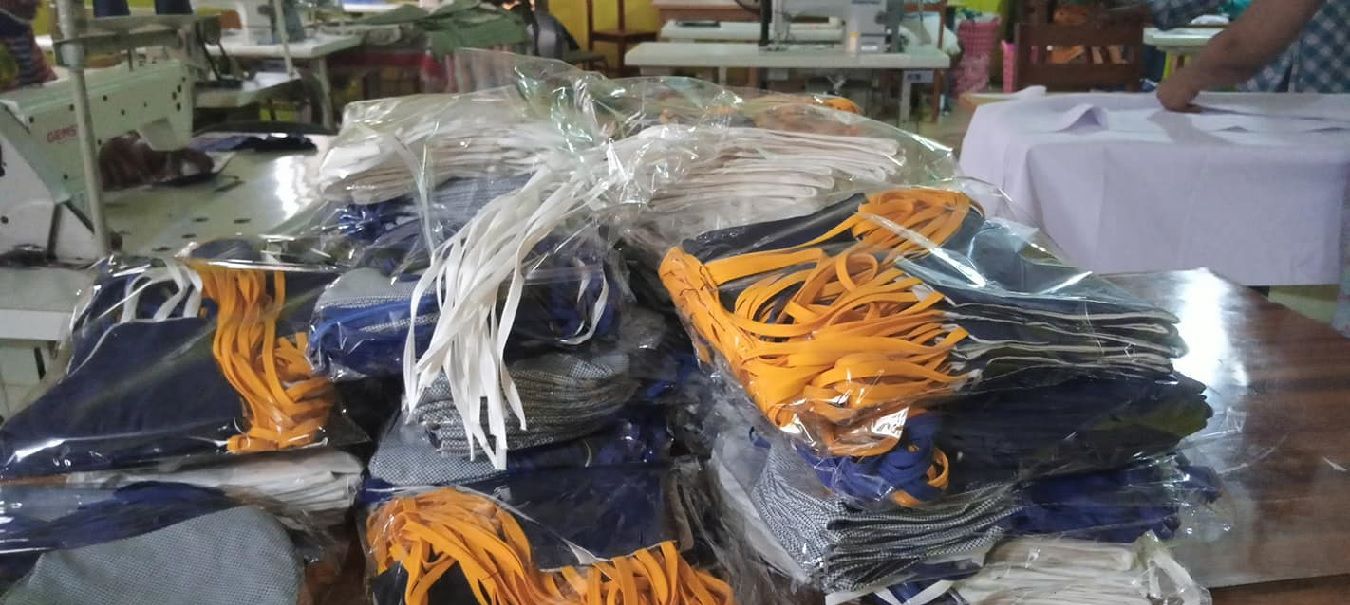By Kobina Aidoo
As the COVID-19 pandemic picked up speed in Ghana in April, the country struggled to access the personal protective equipment (PPE) it needed to safeguard health workers and the rest of its population against the fast-spreading disease.
In response, Ghana’s government called on four apparel companies based in the capital, Accra, to make face masks, head covers, surgical scrubs, and gowns.
In the Western Region of Ghana, another company, Dress Up College of Fashion, noted the surging local demand for PPE and realized it too could make a difference in the fight against coronavirus.
The company, founded by husband and wife team Eric and Abigail Akwabeng, seized the opportunity and shifted their production away from fashionable clothes. Abigail, an expert seamstress, quickly learned how to make scrubs and masks—and then taught her staff to do the same.
“We knew the four companies in Accra couldn’t produce enough PPE quickly enough to cover the whole country,” Abigail said. “I’ve had to teach myself new things in a short period. I get better by the day. “We saw a chance to make a difference, so we moved.”
Thanks in part to support Dress Up had received in 2019 through IFC’s Ghana Local Economic Development (Ghana LED) Program—support that strengthened the business and helped it attract investment—it was able to ramp up production quickly: it added 10 industrial sewing machines to its existing 25 and almost quadrupled its staff to 96.
Despite having to train new hires while enforcing strict social distancing measures in its factory, Dress Up was soon producing up to 2,000 masks a day. Having mastered masks, the nimble company later began making medical scrubs.
Support to Grow
Ghana’s sudden call for protective wear—and the overwhelming response it received from local producers—demonstrates the flexibility and strength of the country’s private sector. But companies like Dress Up need support to grow, succeed, and survive, especially under uniquely challenging conditions.
Along with businesses across Ghana and around the world, Dress Up suffered badly from the punishing effects of COVID-19. Dwindling revenues and difficulties running its training school (which it moved online) forced it to reduce operations and lay off some staff.
The damage to Dress Up might have been worse if it hadn’t been equipped with skills from the Ghana LED Program, which provides management training and other support to help businesses strengthen their systems, improve their operations, and access market opportunities.
The Ghana chapter of the LED program, which has supported 65 local businesses in the country, from the cleaning to construction sectors, is part of a wider LED initiative funded by the Government of Canada and implemented by IFC’s Sustainable Infrastructure Advisory in Côte d’Ivoire, Ghana, Guinea, and Kenya.
“The support from IFC was incredible,” Eric says. “IFC’s training included bookkeeping and financial record keeping, business risk management, business continuity planning, marketing, and other key functions. Most important for Dress Up at that time, the program helped us organize and attract outside investment.”
Brigid Commey, the Ghana LED Program lead, says, “We found Dress Up to be an ideal local business with the potential to make an impact on the local economy, if supported. Not only were they keen to learn new ways of operating, but also they had a training school to equip youth with skills.”
Global Support Package
With COVID-19 threatening businesses around the world, IFC in March launched a global, $8 billion fast-track financing package to help support business continuity and preserve jobs. IFC announced its first investments in companies in Africa in June—and is expected to announce several more on the continent in the coming weeks and months.
In Ghana, Abigail, Eric, and their staff are now receiving training IFC developed in response to the specific challenges wrought by COVID-19. Topics include digital marketing and online trading, managing digital/cyber risk, and cost control, among others.
Inspired by its success producing and providing PPE, Dress Up is already pondering its next move: “Our foray into PPE production has connected us to companies we couldn’t reach in the past, such as big hotels, mining, and oil and gas companies,” Eric says.
Published June 2020
